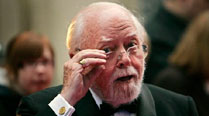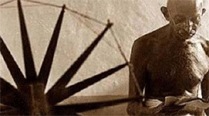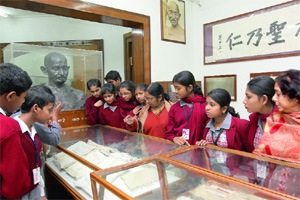Why attacks on Mahatma Gandhi are good
They offer an opportunity to recall what he stood for. The imperfect Gandhi was more radical and progressive than most contemporary compatriots.
1.4K
SHARES
SHARE
Written by Rajmohan Gandhi | Updated: September 9, 2015 12:01 am
RELATED NEWS
Offended by attacks on the Mahatma, some friends who think of me as a scholar ask about a new book which, according to media reports, alleges that during his years in South Africa (1893-1914), Gandhi disdained black people and supported British imperialism. Not having read it, I cannot comment on the book, but I can address the two allegations. Before doing so, however, let me say that attacks on Gandhi should be welcomed, for they offer an opportunity to recall the things Gandhi stood for.
Gandhi’s “answer to doubt”, given around Independence Day in 1947 — also known as the “talisman” — is deservedly famed. In that short text, Gandhi suggested that our uncertainty over the right course to take would disappear once we ask how the most helpless person we have known would be affected by our choice.
RELATED ARTICLE
Retracing Nathuram Godse’s journey
Remembering Richard Attenborough: He put India in the spotlight
Gandhi and Religious Fanaticism
- Dharia could have become PM had he rejoined Cong,recall close aides
Raisina Bengali School visits Gandhi museum
- So Nehru killed Gandhi!!!
Retracing Nathuram Godse’s journey
Remembering Richard Attenborough: He put India in the spotlight
Gandhi and Religious Fanaticism
- Dharia could have become PM had he rejoined Cong,recall close aides
Raisina Bengali School visits Gandhi museum
- So Nehru killed Gandhi!!!
Retracing Nathuram Godse’s journey
Remembering Richard Attenborough: He put India in the spotlight
Gandhi and Religious Fanaticism
- Dharia could have become PM had he rejoined Cong,recall close aides
Raisina Bengali School visits Gandhi museum
- So Nehru killed Gandhi!!!
Less well remembered is Gandhi’s reply when asked, in 1946, to describe the independent India he wished to see. Drawing a geometric picture, Gandhi said he wanted “not a pyramid but an oceanic circle” of complete equality. In such a circle, “the last would be first, in fact there would be no first and no last”, and the individual citizen, not a president or prime minister, would occupy the circle’s centre (Harijan, July 28, 1946).
Yet, along with equality, Gandhi wanted fraternity; along with justice he sought reconciliation. Demanding justice for Dalits, Gandhi also strove for a partnership between Dalits and upper-caste Hindus. He wanted India’s Hindu majority to protect the country’s minorities, but he also wanted Hindu-Muslim friendship, and he asked Pakistan’s Muslim majority to protect that country’s Hindus, Christians and minority-sect Muslims. Internationally, Gandhi wanted a free Palestine (a cause that many in India have chosen to abandon) — but also Arab-Jewish reconciliation.
Looking at the clash today between the need to escape from dangerous and seemingly hellish places and the lack of room in supposedly heavenly places, do we not yearn for persons with the large and just heart and wise mind that Gandhi showed?
The same may be true when people desire to improve today’s dangerous relationship between the so-called Muslim world and the so-called West. Or when we think of inequalities in India, or of conflicts in Syria, Iraq, Yemen, Palestine, Afghanistan and Pakistan.
Dead now for nearly 70 years, Gandhi did not leave behind precise solutions for such problems. But his legacy will aid, not impede, efforts to find the solutions, even if we assume for a moment that between 1893 and 1914, Gandhi was prejudiced about Africa’s blacks and backed British imperialism.
Was Gandhi in favour of imperialism?
For some time yes, and openly so. This is no “discovery”. In fact, as Gandhi put it himself in his autobiography, the British Empire was one of his two passions at the start of the 20th century. (The other was nursing the sick.) Hadn’t Queen Victoriaand other eminent Britons declared that in their empire, all the races would be equal and everyone would enjoy the freedoms of belief and expression and the rule of law? When Gandhi realised that the imperial claim was false, he became, as Winston Churchill and a succession of viceroys complained, the empire’s strongest foe, and India’s masses joined Gandhi in rebellion.
For some time yes, and openly so. This is no “discovery”. In fact, as Gandhi put it himself in his autobiography, the British Empire was one of his two passions at the start of the 20th century. (The other was nursing the sick.) Hadn’t Queen Victoriaand other eminent Britons declared that in their empire, all the races would be equal and everyone would enjoy the freedoms of belief and expression and the rule of law? When Gandhi realised that the imperial claim was false, he became, as Winston Churchill and a succession of viceroys complained, the empire’s strongest foe, and India’s masses joined Gandhi in rebellion.
As for our world’s black people, Gandhi nursed great expectations from them. In February 1936, he said to Howard Thurman, the African-American thinker, who was calling on him in Bardoli in Gujarat: “Well, if it comes true it may be through the African Americans that the unadulterated message of non-violence will be delivered to the world” (Harijan, March 14 1936). Nearly three decades later, when Martin Luther King and his colleagues won their remarkable nonviolent triumphs for black rights in the US, they did not hesitate to say that Gandhi and India had inspired them.
But wasn’t the younger Gandhi at times ignorant and prejudiced about South Africa’s blacks? He undoubtedly was, especially when provoked by the conduct of black convicts who were among his fellow inmates in South Africa’s prisons. This too is no “discovery”. I wrote about it in detail in The Good Boatman in 1995, and dozens of other scholars have referred to it.
After all, Gandhi too was an imperfect human being. However, on racial equality, he was greatly in advance of most if not all of his compatriots; and the struggle for Indian rights in South Africa paved the way for the struggle for black rights. Here is what Gandhi said in 1908 (in a Johannesburg speech), referring specifically to Africans, Asians, Europeans and the mixed: “If we look into the future, is it not a heritage we have to leave to posterity, that all the different races commingle and produce a civilisation that perhaps the world has not yet seen?” (May 18, 1908).
In 1908, the commingling of all the races of the world was a bold thought for anyone, Indian or otherwise, to express. Earlier, during the American Civil War over slavery, Indian intellectuals well aware of that war (including Bankim Chandra Chattopadhyay, Ishwar Chandra Vidyasagar and Syed Ahmed Khan) had remained silent on slavery. Later, when Gandhi insisted that India’s freedom struggle would be hypocritical without a simultaneous fight against untouchability, even close colleagues like Vallabhbhai Patel and Jawaharlal Nehru advised him against what they termed a “distraction”.
The imperfect Gandhi was more radical and progressive than most contemporary compatriots. Today, in India, South Africa and the US, his legacy provides hope, not an obstacle, for the equality of races and castes. A 1995 book contains this observation from Nelson Mandela: “Gandhi had been initially shocked that Indians were classified with Natives in prison… All in all, Gandhi must be forgiven these prejudices in the context of the time and the circumstances.” (“Gandhi the Prisoner” by Nelson Mandela in B.R. Nanda (edited), Mahatma Gandhi: 125 Years, ICCR, 1995.)
Some, however, seem to think that they are wiser than King or Mandela.
The writer, a grandson of Mahatma Gandhi, is research professor at the Centre for South Asian and Middle Eastern Studies, University of Illinois at Urbana-Champaign




